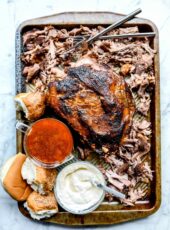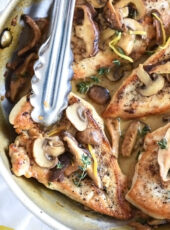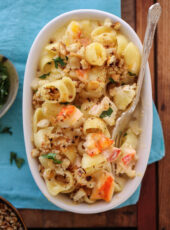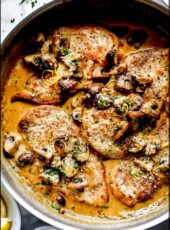Got leftover cooked chicken or turkey? Cook up a pot of soup! This low-sodium soup recipe is a healthier twist on a classic creamy turkey and wild rice soup that hails from Minnesota. Serve with a crisp romaine salad and whole-grain bread.
In This Post
Nutrition Notes
Are Mushrooms Good for You?
Regardless of the type, mushrooms tend to be rich in B vitamins and potassium. You’ll also get fiber and antioxidants, providing a wealth of health benefits. Evidence suggests that mushrooms have anti-inflammatory properties, may boost gut health and are potentially a source of vitamin D—a nutrient that people are commonly deficient in.
Is Wild Rice Healthy?
Wild rice is technically not rice at all. It’s a wild-grown grass and is typically found in a rice blend. Wild rice has a similar nutrition profile to brown rice. According to the U.S. Department of Agriculture (USDA), 1 cup of wild rice provides about 7 grams of protein and is an excellent source of manganese, phosphorous and zinc. You’ll also get about 3 g of fiber in that 1 cup, which is great for gut health.
Tips from the Test Kitchen
Can I Use Turkey Stock Instead of Chicken Broth?
Absolutely! If you have a leftover turkey carcass or even turkey pieces, you can make turkey stock and use it for this recipe. It will give the soup a rich and flavorful turkey flavor.
I Don’t Have Quick-Cooking or Instant Wild Rice. Can I Use Regular Wild Rice Instead?
Yes! If you can’t find the quick-cooking variety, just add cooked conventional wild rice along with the turkey at the end of Step 2. To cook wild rice, add 1 cup of wild rice to a large saucepan of lightly salted boiling water (use at least 4 cups of water). Cook until tender, about 45 to 55 minutes, then drain.
Can I Make Cream of Turkey and Wild Rice Soup Ahead?
Yes, you can make it ahead! Cool the soup completely and refrigerate in an airtight container for up to three days.
Frequently Asked Questions
How Do You Add Rice to Soup Without Getting Soggy?
We use quick-cooking or instant wild rice for the soup, which has been parboiled to reduce the cooking time. The rice is added to the soup toward the end and simmered for 5 to 7 minutes, until tender. If you have cooked wild rice on hand, stir it in with the turkey at the end of Step 2. Adding rice at the end of the cooking prevents it from getting too soggy in the soup.
Additional reporting by Carrie Myers, M.S. and Jan Valdez
Ingredients
1 tablespoon extra-virgin olive oil
2 cups sliced mushrooms, (about 4 ounces)
¾ cup chopped celery
¾ cup chopped carrots
¼ cup chopped shallots
¼ cup all-purpose flour
¼ teaspoon salt
¼ teaspoon freshly ground pepper
4 cups reduced-sodium chicken broth
1 cup quick-cooking or instant wild rice, (see Ingredient Note)
3 cups shredded cooked turkey or chicken (12 ounces; see Tip)
½ cup reduced-fat sour cream
2 tablespoons chopped fresh parsley
Local Offers
00000
Directions
Heat oil in a large saucepan over medium heat. Add mushrooms, celery, carrots and shallots; cook, stirring, until softened, about 5 minutes. Add flour, salt and pepper; cook, stirring, for 2 minutes more.
Add broth and bring to a boil, scraping up any browned bits. Add rice and reduce heat to a simmer. Cover and cook until the rice is tender, 5 to 7 minutes. Stir in turkey (or chicken), sour cream and parsley; cook until heated through, about 2 minutes more.
Tip
To poach chicken breasts, place boneless, skinless chicken breasts in a medium skillet or saucepan. Add lightly salted water to cover and bring to a boil. Cover, reduce heat to low and simmer gently until chicken is cooked through and no longer pink in the middle, 10 to 12 minutes.
Originally appeared: EatingWell Soups Special Issue April 2016
Nutrition Facts (per serving)
| 378 | Calories |
| 11g | Fat |
| 29g | Carbs |
| 37g | Protein |
| Nutrition Facts | |
|---|---|
| Servings Per Recipe 4 | |
| Serving Size about 1 3/4 cups | |
| Calories 378 | |
| % Daily Value * | |
| Total Carbohydrate 29g | 10% |
| Dietary Fiber 3g | 10% |
| Total Sugars 3g | |
| Protein 37g | 74% |
| Total Fat 11g | 14% |
| Saturated Fat 4g | 19% |
| Cholesterol 80mg | 27% |
| Vitamin A 4518IU | 90% |
| Vitamin C 6mg | 7% |
| Folate 57mcg | 14% |
| Sodium 364mg | 16% |
| Calcium 73mg | 6% |
| Iron 2mg | 13% |
| Magnesium 46mg | 11% |
| Potassium 748mg | 16% |
Nutrition information is calculated by a registered dietitian using an ingredient database but should be considered an estimate.
* Daily Values (DVs) are the recommended amounts of nutrients to consume each day. Percent Daily Value (%DV) found on nutrition labels tells you how much a serving of a particular food or recipe contributes to each of those total recommended amounts. Per the Food and Drug Administration (FDA), the daily value is based on a standard 2,000 calorie diet. Depending on your calorie needs or if you have a health condition, you may need more or less of particular nutrients. (For example, it’s recommended that people following a heart-healthy diet eat less sodium on a daily basis compared to those following a standard diet.)
(-) Information is not currently available for this nutrient. If you are following a special diet for medical reasons, be sure to consult with your primary care provider or a registered dietitian to better understand your personal nutrition needs.
Powered by the ESHA Research Database © 2018, ESHA Research, Inc. All Rights Reserved

:max_bytes(150000):strip_icc():format(webp)/cream-of-tukery-and-wild-rice-soup-2fe0b47d43f440cb8033b3a7fa7c0a1f.jpg)





